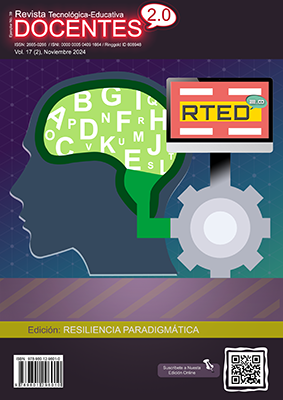101 Things I learned at the Huelva Art School
 DOI:
https://doi.org/10.37843/rted.v17i2.516
DOI:
https://doi.org/10.37843/rted.v17i2.516
Main Article Content
Abstract
In Higher Education Design, when planning the Didactic Units of each subject, teachers usually include the bases and requirements of a contest. In addition to carrying out an evaluable exercise, students can participate as designers from their student stage, thus promoting their inclusion in the labor market. The research's objective was to create an artistic production that combines the participation of students with their teachers, gathering 101 reflections on our studies and, consequently, leads to academic improvement. The research is based on the hermeneutic method, pragmatic paradigm, mixed approach, dialectical design, and multifaceted type. The research population is made up of the educational community of the art school. The instruments for collecting information have been interviews and questionnaires prepared by the students. The critical analysis of the results has been developed as a lucrative debate in the classroom, with the final result reflected in a physical and digital creation to be disseminated to other centers. In short, the research ends with a useful resource that can serve as a reference for other similar art centers.
Downloads
Metrics
Article Details

This work is licensed under a Creative Commons Attribution-NonCommercial-NoDerivatives 4.0 International License.
Those authors who have publications in our journal accept the following terms:
- When a work is accepted for publication, the author retains rights of reproduction, distribution of his/her article for exploitation in all countries of the world in the format provided by our magazine and any other magnetic medium, optical, and digital.
- Authors will retain their copyright and guarantee the journal the right first to publish their work, which will be simultaneously subject to the Creative Commons Acknowledgment License (Attribution-NonCommercial-NoDerivatives 4.0 International (CC BY-NC-ND 4.0)). That allows third parties to copy and redistribute the material in any medium or format, under the following conditions: Acknowledgment - You must properly acknowledge authorship, provide a link to the license, and indicate if any changes have been made. You may do so in any reasonable way, but not in a way that suggests you have the licensor's endorsement or receive it for your use. NonCommercial - You may not use the material for a commercial purpose. NoDerivatives - If you remix, transform, or build from the material, you cannot broadcast the modified material. There are no additional restrictions - You cannot apply legal terms or technological measures that legally restrict you from doing what the license allows.
- Authors may adopt other non-exclusive license agreements to distribute the published version of the work (e.g., deposit it in an institutional archive or publish it in a monographic volume) provided that the initial publication in this journal is indicated.
- Authors are allowed and recommended to disseminate their work through the Internet (e.g., in institutional telematic archives, repositories, libraries, or their website), producing exciting exchanges and increasing the published work's citations.
- Request of withdrawal an article has to be done in writing by the author to the Editor, becoming effective after a written response from the Editor. For this purpose, the author or authors will send correspondence via e-mail: [email protected].
- The author will not receive financial compensation for the publication of his work.
- All Docentes 2.0 Journal publications are under the Open Journal System (OJS) platform at: https://ojs.docentes20.com/.
References
Allueba Pinilla, A., & Aljandre Marco, J. (2019). ENFOQUES y experiencias de innovación educativa con TIC en educación superior. Prensas de la Universidad de Zaragoza. DOI: https://doi.org/10.26754/uz.978-84-17873-76-9
Balbuena Palacios, M. (2014). Teoría de la Representación simbólica en la comunicación gráfica [Tesis doctoral].
Betancur-Franco, M. I., & Gómez-Sicard, N. (2015). Clima emocional del aula: una revisión sistemática. https://n9.cl/8bzey
Botella, J. & Zamora, A. (2017) El metaanálisis: una metodología para la investigación en educación. Educación XXI: Revista de la Facultad de Educación, 20 (2), 17-38. https://n9.cl/grja7h DOI: https://doi.org/10.5944/educxx1.19030
Cortés Rincón, A. (2016). Prácticas innovadoras de integración educativa de TIC que posibilitan el desarrollo profesional docente [Tesis doctoral]. Universidad autónoma de Barcelona. https://n9.cl/c7jhm
Freire, P. (2008). Pedagogía del oprimido. Revista historia de la educación latinoamericana. 10, 57-72. https://n9.cl/u6l3r9
García, M. (2009). 101 cosas que aprendí en la escuela de Arquitectura. https://n9.cl/vzgdw
Hidalgo Apunte, M. E. (2021). Reflexiones acerca de la evaluación formativa en el contexto universitario. Revista Internacional De Pedagogía E Innovación Educativa, 1(1), 189–210. https://doi.org/10.51660/ripie.v1i1.32 DOI: https://doi.org/10.51660/ripie.v1i1.32
Jurado Gómez, C. (2009). La participación educativa del alumnado. Innovación y experiencias educativas. ISSN 1988-6047.
Martínez Clares, P., Martinez Járez, M., & Muñoz Cantero, M. (2008). Aprendizaje de competencias en educación superior learning of competence in higher education. Revista galego-portuguesa de psicoloxía e educación. 16, 1-2.
Prieto Navarro, B., Morales Vallejo, P., & Torre Puente, J. (2008). La enseñanza universitaria centrada en el aprendizaje: estrategias útiles para el profesorado. Octaedro/ICE-UB. https://n9.cl/5skxv
Quintana, L. (2019). La hermenéutica como método de interpretación de textos en la investigación psicoanalítica. Perspectivas en Psicología: Revista de Psicología y Ciencias Afines, 16(2), 73-80. https://n9.cl/qutcz
Vezub, L. F. (2007). La formación y el desarrollo profesional docente frente a los nuevos desafíos de la escolaridad. Profesorado Revista de Currículum y Formación de Profesorado, 11(1). https://n9.cl/oaxid
White, K. (2011). 101 cosas que aprendí en la escuela de Arte. Editorial Gustavo Gili.
Zavala López, M. (2019). El papel del docente en el proceso enseñanza aprendizaje, con o sin tecnología, para captar la atención del estudiante. https://n9.cl/3kyf9






